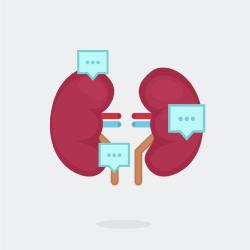The ethics of using social media to find living kidney donors
Investigators: Professor Heather Draper and Greg Moorlock
Our research identified and explored ethical issues that arise from establishing relationships online with the intention of finding an ‘altruistic’ living kidney donor. We were particularly interested in the roles of trust and empathy in these relationships.
Most living organ donors are family members or close friends of the recipient. Occasionally people donate anonymously to complete strangers, and typically such donors donate into the general donor pool. The gifted organs – usually only kidneys – are then allocated according to the same principles as deceased donation. Clinicians increasingly have been asked to perform transplants from donors whom recipients have met on-line, on sites or webpages set up – sometimes on a commercial basis – for the purpose of matching willing donors to those in need of a transplant. Trade in organs is illegal in the UK, so regulations permit transplants to proceed only where the two parties have met on a strictly not-for-profit site. Nonetheless, such ‘on-line pairings’ challenge the understanding of altruism traditionally used in transplantation. Concerns have been raised regarding the creation of a ‘beauty contest’ dynamic, whereby the most appealing patients stand a greater chance of receiving a transplant. Other concerns have been raised about the potential for coercion, exploitation or commercial transactions.
We have explored these ethical issues, and considered ways in which the potential of social media can be used to full effect, whilst mitigating many of the risks that have previously raised concerns. You can read our briefing documents by clicking on the links below.
Publications
As well as the publications below, we have produced two ‘fact sheets’ outlining the ethical considerations. The first of these is aimed at people considering using social media to find a donor, and the second is aimed at transplant practitioners.
- Moorlock, Greg. "Directed altruistic living donation: what is wrong with the beauty contest?." Journal of Medical Ethics 41.11 (2015): 875-879.
- Moorlock, Greg and Draper, Heather. “Empathy, Social Media and Directed Altruistic Living Donation” Bioethics (forthcoming)
Further Information
For more information about this research, please feel free to contact us:
Heather Draper – H dot Draper at warwick dot ac dot uk +44 (0)2476 150347
Greg Moorlock – g dot moorlock at warwick dot ac dot uk +44 (0)2476 151592
This work was supported by funding from the ESRC (in partnership with AHRC, EPSRC, Dstl and CPNI) under its EMoTICON call. For further information about the Space for Sharing project, click here.

